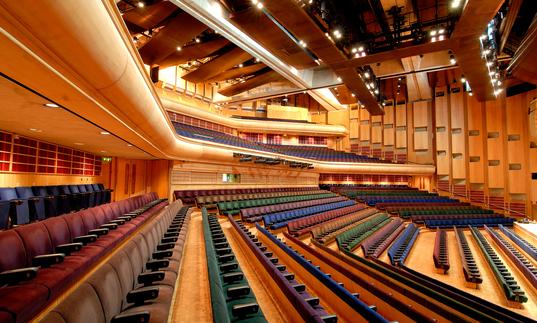The Trace of the Butterfly: A Tribute to Rim Banna
90 minutes no interval
Please note all timings are approximate and subject to change.

Martin Aston looks into the musical history of Rim Banna and the meaningful importance of this tribute show.
‘I am resisting two cancers,’ said Rim Banna. ‘The occupation and the one inside my body.’
The Palestinian singer-songwriter, who lost her battle with cancer in March 2018, was famously a fighter – or perhaps ‘campaigner and ‘protester’ are more salient descriptions for her. Banna never advocated violent resistance but used music and words to frame her humanitarian beliefs. Now that she has gone, Banna’s friends, acolytes and admirers intend to carry on her message, and her music, starting with this tribute concert.
‘The Trace Of A Butterfly’, the song that lends its name to this collective performance, comes from Banna’s album Revelation Of Ecstasy And Rebellion, which set ancient and modern poems from Tunisia, Palestine, Iraqi Persia and Andalusia to Banna’s original melodies. The album was released in 2013, four years after her initial diagnosis of breast cancer – but she was still consumed by the ideals of ecstasy and rebellion: that’s the kind of extraordinary and committed artist and personality she was.
Even when her health impacted on her ability to perform, Banna didn’t surrender the cause. In 2015, doctors announced that Banna’s vocal cords were partially paralysed and she wouldn’t be able to sing again. But that year, she met her Norwegian producer Erik Hillestad (his KKV record label had been involved with Banna since 2003) and Tunisian ‘sound cutter’ SC MoCha from the electronic activist collective Checkpoint 303 to discuss an audacious project. Checkpoint 303 would transform data from Rim’s digital medical scans and portraits into sound, over which she would recite her poetry; in the end, she also sang, adding her last vocal in January 2018, two months before she died. Jazz pianist Bugge Wesseltoft also joined the project that became her 13th and final album, Voice Of Resistance.
Lebanese singer-songwriter Tania Saleh, one of this tribute’s featured singers, first met Banna in 2003. ‘Rim was organising a festival in Oslo in 2013, and contacted me,’ she recalls. ‘We found we had a lot in common: we were both mothers, divorced, and working without managers or agents. And we were freedom fighters. Rim was a serious composer too, which is also rare among women in this part of the world. She was a very strong woman – she would travel across borders to perform, which involved many long road trips, even when she was ill. Rim was very funny too. And she knew what she wanted. It’s easy to just sing traditional songs, but Rim never wanted to imitate anyone. Most importantly, Rim could express herself in the midst of all the political and social problems she was immersed in.’
Saleh’s will be joined on the Barbican stage by Tunisian singer-songwriter Sabrine Jenhani, Syrian MC / hip hop producer Bu Kolthoum and Palestinian pianist / composer Faraj Suleiman, who has rearranged all of the chosen Banna songs for this performance, ‘as a way to re-engage with Rim and respond to her work,’ explains the tribute organiser Khaled Ziada.
Ziada moved to London from Gaza over 20 years ago, and later started the events company MARSM to promote Arabic culture in the UK and beyond, such as this Barbican tribute. ‘I never met Rim but I was always a big fan of her, and her musical journey – she was always changing,’ he says. ‘For example, she made a beautiful children’s album, which gave her amazing credibility in Palestine. And Rim believed strongly in collaboration with musicians from outside the Arab world. I respect artists who explore and develop classical culture into something new and exciting, stepping outside the restrictive confines of commercial music.’
Born in Nazareth, Banna’s musical journey began at the High Institute for Music in Moscow, studying singing and conducting. She released two live albums, Jafra (1985) and Your Tears, Mother (1986) before graduating in 1991 and returning to Nazareth, where she gathered Palestinian children's songs on the verge of being forgotten for the album The Dream (1993). New Moon (1995) set Palestinian texts and poems to Banna’s own traditionally influenced melodies; likewise, Mukaghat (1996) with Palestinian nursery rhymes.
Internationally, Banna emerged via Erik Hillestad’s 2003 compilation, Lullabies From The Axis of Evil, featuring female singers from those nations deemed enemies of freedom by US president George W. Bush. Krybberom (1993) and The Mirrors Of My Soul (2005) were more east-meets-west folk-styled albums backed by Norwegian musicians, continued to spread the word. The latter album included ‘The Grandma With A Limp’, which Tania Saleh has chosen to interpret for the Barbican tribute. ‘It’s such a funny, unexpected and original song, and very different in style, with a rock influence’ she says.
Saleh will also be singing the children’s song ‘Our Donkey’ (from 2009’s April Blossoms), ‘Loving You’ (from Voice Of Resistance), ‘Trace Of A Butterfly’ itself (with words by Palestinian poet Mahmoud Darwish) and ‘Don’t Increase His Agony’ (from Revelation Of Ecstasy And Rebellion, with words by Iraqi poet Bader Shaker al-Sayyab). These five songs alone illuminate Banna’s journey – spiritual, emotional and musical, across hope, despair, anger, love, humour and compassion.
‘Rim resisted in a very peaceful way, the way she understood the most, which I am extremely respectful of,’ says Tania Saleh. Tonight, she and her collaborators have the chance to pay respects to, and to preserve the legacy of, the legendary Rim Banna.
90 minutes no interval
Please note all timings are approximate and subject to change.
Backstage tours
Discover
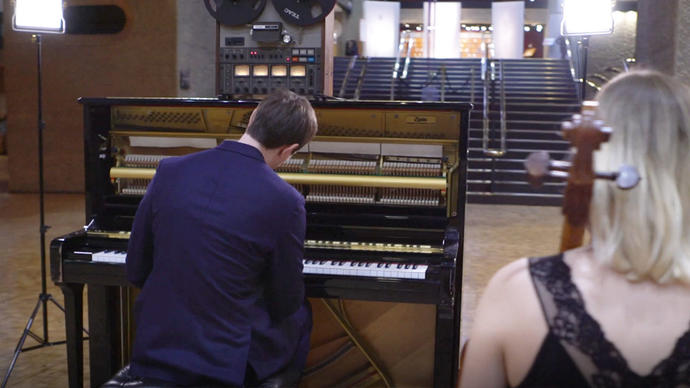
Barbican Sessions: Erland Cooper
Scottish multi-instrumentalist and producer Erland Cooper brings a tape machine, a piano and a cello together for an intimate performance in the Barbican Foyer.
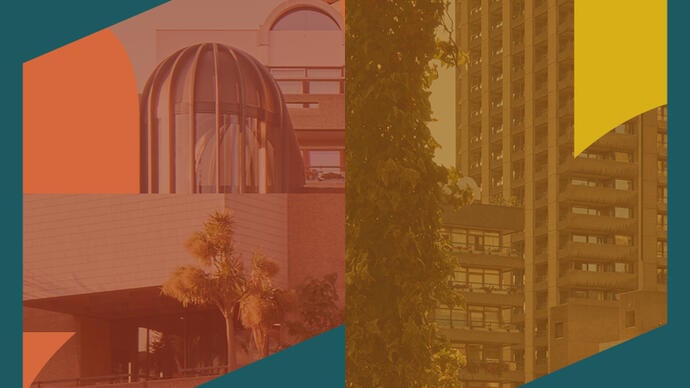
Listen: Barbican Recommends
Not sure what to listen to? Every month we update our Barbican Recommends Spotify playlist with what we've been listening to in the office. Expect everything from Punk to Jungle to Classical.

Watch: Rim Banna - Astonished By You and Me (Live)
Watch Rim Banna perform live in Oslo, back in 2013.
You might also like...
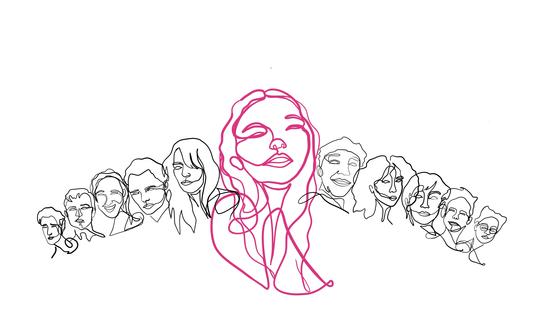
Barbican Hall
Location
The Barbican Hall is located within the main Barbican building. Head to Level G and follow the signs to find your seating level.
Address
Barbican Centre
Silk Street, London
EC2Y 8DS
Public transport
The Barbican is widely accessible by bus, tube, train and by foot or bicycle. Plan your journey and find more route information in ‘Your Visit’ or book your car parking space in advance.
We’ve plenty of places for you to relax and replenish, from coffee and cake to wood-fired pizzas and full pre-theatre menus
Mobility
Spaces for wheelchair users in row U at the rear of the stalls (up to sixteen, depth of row 180cm) and the back row of the circle (four), both with fold-down companion seats. Some seats in row S of the stalls for people with very limited mobility.
Assistance dogs
Assistance dogs may be taken into the concert hall where there are a limited number of suitable seats in row G of the stalls. If you prefer, you may leave your dog with a member of the cloakroom staff during the performance.
Hearing facility
There is an induction loop in the concert hall. You can use this by adjusting your hearing aid to the ‘T’ setting.
Free large-print programmes
These are available for most of our concerts. Please contact [email protected] at least a week beforehand, to prebook a large-print programmme.
For more access information, please visit our Accessibility section.
Plan your visit
Meet friends, grab a drink, drop in to one of the free installations on Level G before the show - here's what else is happening at the Barbican when you visit.

Living Colour
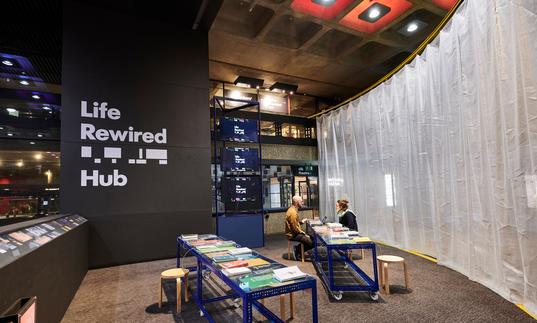
Part of Life Rewired







